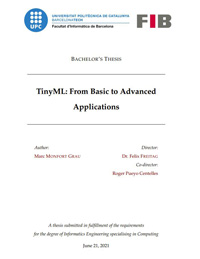
TinyML: From Basic to Advanced Applications
TinyML aims to implement machine learning (ML) applications on small, and lowpowered devices like microcontrollers. Typically, edge devices need to be connected to data centers in order to run ML applications. However, this approach is not possible in many scenarios, such as lack of connectivity. This project investigates the tools and techniques used in TinyML, the constraints of using low-powered devices, and the feasibility of implementing advanced machine learning applications on microcontrollers.
To test the feasibility of implementing ML applications on microcontrollers, three TinyML programs were developed. The first, a basic keyword spotting application able to recognize a set of words. The second, a program for training a neural network model on a microcontroller following an online learning approach. And the third, a federated learning program able to train a single global model with the aggregation of local models trained on multiple microcontrollers. The results show optimal performance in all three applications once deployed on microcontrollers. The development of basic TinyML applications is straightforward when the machine learning pipeline is understood. However, the development of advanced applications turned out to be very complex, as it requires a deep understanding of both machine learning and embedded systems.
These results prove the feasibility of successfully implementing advanced ML applications on microcontrollers, and thus, unveil a bright future for TinyML.










